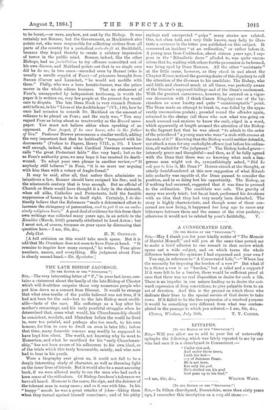THE LATE BISHOP JACOBSON.
[To THE EDITOR OF THE "SPECTATOR."] Snt,—The very interesting letter of "F.," in your last issue, con- tains a statement about the family of the late Bishop of Chester which will doubtless surprise those very numerous people who put him down as a convert from Dissent. It would be strange that what nine-tenths of the public believed was not true, if it had not been for the sad—but to the late Bishop most credit- able—facts of the case. His sufferings as a boy after his mother's remarriage, and his early youthful struggles when he determined that, come what would, his Churchmanship should be consistent, resolute, and blameless before the world he lived in, were too painful, and perhaps also too much, to his own honour, for him to care to dwell on even in later life ; before that time, many domestic reasons may readily be supposed to have kept him silent. The world, not knowing why he went to Homerton, and what he sacrificed for his "early Churchman- ship," has not been aware of his adherence to his own ideal, or of the trials which this truly honourable, saintly, and wise man had to bear in his youth.
Were a biography ever given us, it could not fail to be a deeply interesting study of character, as well as throwing light on the inner lives of friends. But it would also be a most amusing book, if we were allowed really to see the man who had such a keen sense of the ridiculous. Of Bishop Jacobson's tolerance we have all heard. Humour is the cause, the sign, and the defence of the tolerant man in many cases ; and so it was with him. In his " happy " moods he was a great retailer of jokes—liking them 'when they turned against himself sometimes ; and of his pithy
sayings and unexpected " quips " many stories are related. One, not often told, and very little known, may help to illus- trate a sentence in the letter you published on this subject. It concerned an incident" at an ordination," or rather before it. A young man from Cuddesdon, about sixteen years ago, I sup- pose in the "Ritualistic dress" alluded to, was quite uncon- scious that he, waiting with others forthe procession to be formed, was being eyed by Dean Howson. All the other " assistants " at the little scene, however, as they stood in and about the Chapter House, noticed the growing desire of this dignitary to call the attention of the diocesan to his candidate. The Bishop, who said little and observed much at all times, was perfectly aware of the Deacon's supposed failings and of the Dean's excitement. With the greatest earnestness, however, he entered on a vigor- ous discussion with (I think Canon Kingsley) one of the by- standers on some knotty and quite " uninterruptable " point. The Dean made an attempt to break in, was foiled by the appa- rently unconscious prelate ; prowled round the offender again, returned to the charge (all those who saw what was going on much amused and anxious to know the end), edged in a word, which apparently at length aroused the attention of the Bishop to the flagrant fact that he was about "to admit to the order of the priesthood" a young man who wore "a stole with crosses at the ends of it 1" Knowing that the Bishop would neither defend it, nor attack a man for any such slight offence just before his ordina- tion, all waited for "the judgment." The Bishop looked grave— intensely grave and thoughtful—and then, as if he fully agreed with the Dean that there was no knowing what such a dan- gerous man might not do, sympathisingly asked, "Did lie, ask you to kiss it, Mr. Dean ?" Horror-struck at the thought, or utterly dumbfoundered at this new suggestion of what Ritual- istic audacity WU capable of, the Dean paused to consider the position, and in so doing lost his opportunity. The Bishop, as if nothing had occurred, suggested that it was time to proceed to the ordination. The candidate was safe. The gravity of many was sorely tried ; but he, at least, performed his devotions with no idea that they had very nearly been disturbed. The story is highly characteristic, and though some of those eon- cerned are now living, it happened too long ago to cause any bitterness between them and the manes of the wise prelate,—
otherwise it would not be related by your's faithfully, V.


































 Previous page
Previous page